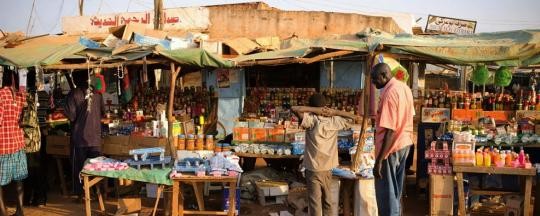Cross-border trade between Sudan and South Sudan’s Warrap and Western Bahr al Ghazal states has ground to a halt, resulting in a rise in commodities prices in the two hunger-affected states.
Traders attributed the sharp rise in consumer prices in the two states to the stopping of traffic with Sudan besides poor road conditions between the two areas and South Sudan’s capital Juba.
A number of citizens told Radio Tamazuj that goods have doubled in price in state capitals Wau and Kwajok and other towns and stressed that the reason is that Sudanese authorities prevented transit of goods from the states bordering Northern Bahr al Ghazal.
Sudan’s announced that its intention is to improve security for the upcoming elections by reducing cross-border threats.
“Really the increase in prices in Kwajok is due to the closure of the road between north Sudan and South Sudan on the route through Majok Yinthiou in Northern Bar al Ghazal, because Omar al Bashir closed the road for the elections,” said a trader in Warrap.
Meanwhile, relief agencies have been forecasting food shortages in Warrap State in particular. According to Kennedy Nanga, Bahr al Ghazal Coordinator for the Food Security Cluster, “The food security situation is more severe in most of the counties in Warrap which experienced crop failure [due to floods and sorghum disease].”
In a paper dated 30 March, Nanga said the food security situation in the region is likely to deteriorate further in the coming months as the lean season sets in. “Price inflation for imported commodities is likely to accelerate threefold due to limited cross border supplies and reduced Dollar supplies/ local currency (SSP) depreciation,” he stated.
“There is a high likelihood of total market failure in the region in the coming months. Food prices inflation will peak while market supplies will be greatly depressed. Livestock prices will continue to decrease, greatly compromising the purchasing power of livestock keepers.”
On the positive side, however, sufficient supplies of fish during the current season and into the rainy season will provide temporary relief to some households, according to Nanga. Increased consumption of wild foods including fruits is also expected to sustain vulnerable households during the lean period, he noted.



